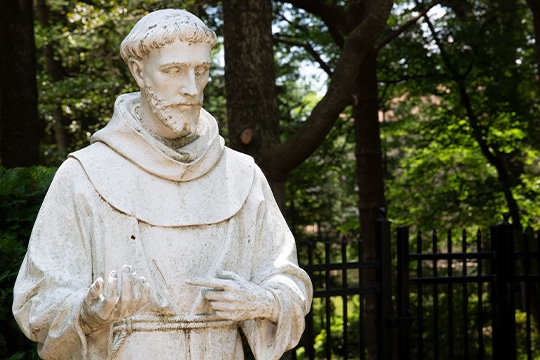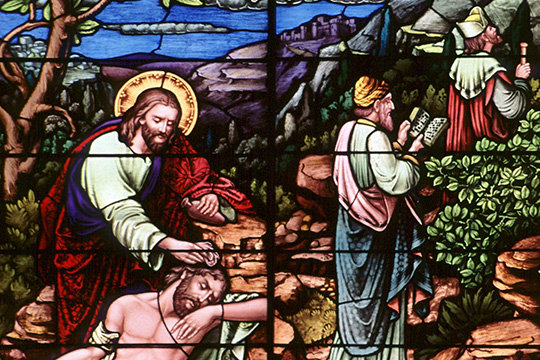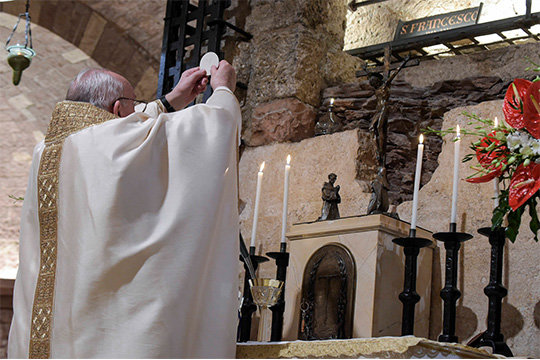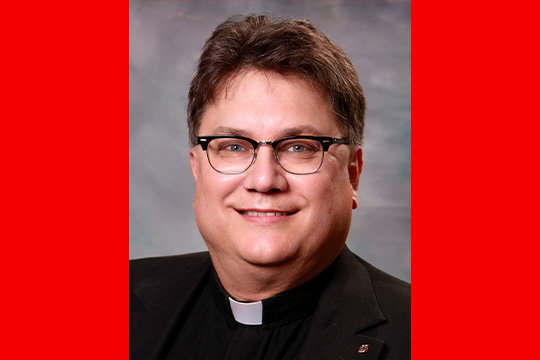Msgr. Makarewicz explores challenging message of pope’s new encyclical

CLICK HERE to read the full text of “Fratelli Tutti."
Eight hundred years ago, God sent a poor man who had been rich to help rebuild a Church and a society that were falling into ruin.
It was Francis of Assisi, a saint ideally suited to his own time and to ours.
“He put the Gospel into practice,” said Monsignor Marion Makarewicz, pastor of Our Lady of the Lake Parish in Lake Ozark. “He preached the Good News with charity and his whole way of being.”
The first pope to be called Francis draws abundant inspiration from his 13th-century forebear in his latest encyclical letter to the whole Church.
In fact, Pope Francis traveled to St. Francis’s hometown on Oct. 3, the saint’s feastday, to sign the encyclical.
Titled “Fratelli Tutti (All Brothers), on Fraternity and Social Friendship,” the pope’s letter is an urgent reminder of the bonds of kinship and solidarity that necessarily define all who follow Christ.
“The key is that we are all brothers and sisters, we are children of God,” said Msgr. Makarewicz, who began studying the encyclical even before it was released in English. “We’re members of one family throughout the world, and that is more important than any other human distinction.”
The pope weaves St. Francis’s writing and teaching into the cloth of “Fratelli Tutti” and gives ample exposition to Jesus’s Parable of the Good Samaritan (Luke 10:25-37).
In that parable, Jesus tells of a man who was robbed, beaten and left for dead. Two standard-bearers for religious virtue find excuses not to help, but a despised foreigner goes out of his way to give aid to the injured man and see to it that his needs are met.
Jesus then asks who was truly a neighbor to the robbers’ victim.
“The one who treated him with mercy,” a man stated, to which Jesus responded, “Go and do likewise.”
Similarly, St. Francis often referred to people of all backgrounds and stations in life as his brothers and sisters. He and the order of “little brothers” he founded went forth to treat people in need like family.
Tough times
In “Fratelli Tutti,” Pope Francis cuts through centuries of popular piety surrounding the beloved saint, revealing a man who made himself poor in order to point people toward the riches of eternal life.
“Why a saint for the poor at that time in history?” Msgr. Makarewicz asked. “Why was he needed, and why when he started living a certain way was he so successful?”
St. Francis had a supernatural encounter with Christ, which led to a radical conversion of heart.
He renounced his possessions and aristocratic status, took a vow of extreme poverty and began ministering to the poor.
His teaching was direct, challenging, even irksome to many of his contemporaries.
They were not all that different from the people Pope Francis is writing to today.
Thirteenth-century Europe had many of the problems modern-day societies are grappling with.
Wars between civilizations were being fought. Economies were changing from mostly farming to a heavier emphasis on production and trade.
Merchants were amassing great fortunes. Individual nations were growing more powerful. Migrants were flooding cities, disrupting the social order.
Deadly plagues were afflicting large swaths of the population.
“The very stable social organization of the countryside and the religious life that had grown up with it was no longer able to attend to all of the needs of the people,” said Msgr. Makarewicz.
“Suddenly, you had hordes and hordes of poor people who were also un-evangelized,” he stated. “And that’s why St. Francis and St. Dominic were so successful. They were helping people who were not being helped. They were preaching to people who were not being preached to.”
Mendicant orders such as the one St. Francis founded not only preached the Word of God, they educated and, especially in the case of the Franciscans, took care of the sick and the poor.
No exceptions
Msgr. Makarewicz studied moral theology at the Academy of St. Alphonsus in Rome. He taught high school seminarians for his first 14 years of Priesthood before taking on full-time parish work.
A lifelong student of history and the teachings of St. Peter’s successors, he eagerly anticipated Pope Francis’s third encyclical and began reading it in Italian, the first language it was released in.
The priest pointed out that papal encyclicals are addressed to the entire Church throughout the world, not specific regions.
“I think the point of an encyclical is to remind us that our own parochial concerns need to be subservient to the common good of the Universal Church,” he said.
“‘Fratelli Tutti’ is a reminder to all that beyond every contingent difference is the fact that we are all brothers and sisters, children of One God and Father,” he stated.
By highlighting the Good Samaritan, the pope illustrates that there can be no exceptions to Jesus’s command to “love your neighbor as yourself.”
In fact, Jesus taught that love of God and love of neighbor are inseparable.
“Pope Francis reminds us that the person who has the first and greatest claim on our love is the stranger in need,” said Msgr. Makarewicz. “It is only in loving the stranger that charity finds its perfect expression.”
The priest said the tendency when reading a document such as “Fratelli Tutti” is to look for exceptions that excuse the reader from taking difficult truth to heart.
“Within our minds, the automatic response to such an impractical and lofty ideal is to say, ‘Yes, but ...,’” he said.
The first step to conversion is to ignore that impulse and simply say, “yes.”
“Each of us need to look at this and ask, ‘What is this teaching me that I need to know?’” said Msgr. Makarewicz.
Common good
The Pope’s encyclical calls nations to task for not cooperating enough to address such scourges as organized crime, human trafficking, environmental degradation and exploitation of the world’s poorest and most vulnerable people.
While acknowledging that globalization has helped lift people out of poverty, Pope Francis points to the resulting rise of corporations that wield more influence than most governments.
They are capable of causing great harm unless nations and people of faith work together to keep them in check.
The Pope points out that migration and the related conflicts and disruptions are as old as human history.
While affirming the legitimacy and necessity of national borders and authority, the Pope emphasizes that human rights come not from governments but from God.
Nations throughout the world must therefore agree to uphold those rights.
“The encyclical is very clear in saying we need to look at immigration on a global scale and not just on what’s good for my country or what my country needs,” Msgr. Makarewicz noted.
And while clearly upholding the right to public property, the pope reminds the faithful that “the right to property is secondary to the universal destination of goods of this earth for the common good,” the priest said.
In other words, as Pope Francis and his predecessors have stated repeatedly, economies must serve people, not the other way around.
These are moral, not ideological issues, the pope insists.
Free from fear
Msgr. Makarewicz said Pope Francis’s insights are reminiscent of St. Therese of Lisieux, who stated that the best way to get to heaven is to live as if you’re already in heaven — namely, in communion with all humanity.
Such a way of living has overwhelming power to lead people to Christ.
“So St. Francis is the perfect model for our times,” said Msgr. Makarewicz. “We might be amazed at what he was able to accomplish in his short life and the inspiration he has provided for so many generations of Christians and non-Christians alike.”
Mindful that it has been subject to criticism in popular media, Msgr. Makarewicz encourages Catholics to read the entire encyclical for themselves.
He hopes prayer groups and other circles of friends and acquaintances will discuss the document and concrete ways to put the pope’s teaching into practice.
He pointed out that all Christians are being called to the degree of ongoing conversion that St. Francis consented to experiencing throughout his life.
“The change we wish to happen in the world must begin with a change in our own hearts,” the priest declared, “where the love of God casts out all fear and impels us to share that love with all our brothers and sisters in this world.”
Comments
Other items that may interest you
Services
The Catholic
Missourian
2207 W. Main St.
Jefferson City MO 65109-0914
(573) 635-9127
editor@diojeffcity.org









